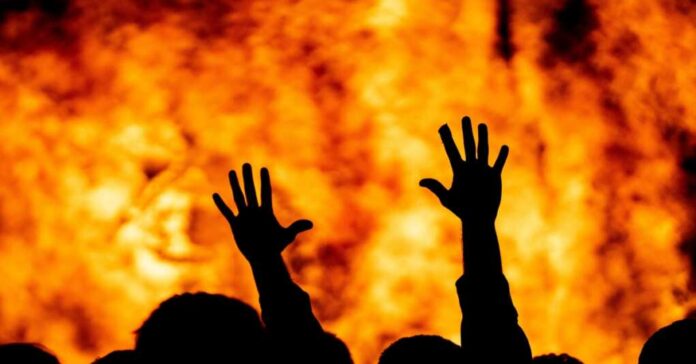
In a dramatic and tragic turn of events, a 37-year-old man set himself ablaze near the Lower Manhattan courthouse where the trial of former President Donald J. Trump is underway. The incident occurred on a Friday afternoon, sparking chaos and horror among witnesses as they watched the flames consume the man who had thrown anti-government pamphlets into the air just moments before.
Reports indicate he had been distributing those pamphlets and voicing conspiracy theories in Collect Pond Park, adjacent to the courthouse, around 1:30 p.m. and was pronounced dead in the early hours of Saturday morning.
NYPD Chief of Department James Maddrey described the pamphlets as containing propaganda-like content, delving into conspiracy theories about Ponzi schemes and alleging connections between local educational institutions and organized crime.
According to NYPD Chief of Detectives Joseph Kenny, Azzarello’s actions appeared to be motivated by a deep belief in these conspiracy theories, leading him to stage this dramatic protest near the Trump trial without breaching any security checkpoints.
A letter found at the scene and Azzarello’s online manifesto shed light on his motivations. In his writings, Azzarello expressed grave concerns about what he perceived as a totalitarian con perpetrated by the U.S. government and its allies. His manifesto warned of an impending “apocalyptic fascist world coup.” It accused the government of engaging in Ponzi schemes to control the populace.
The man, identified as Max Azzarello from St. Augustine, Fla., had been seen earlier in the week outside the Manhattan Criminal Courthouse. According to reports, Azzarello doused himself with an accelerant before igniting the flames, creating a scene of panic as onlookers screamed and scrambled to safety. Despite efforts by bystanders to extinguish the fire, the intensity of the blaze was overwhelming.
Law enforcement swiftly responded, with dozens of police officers arriving to contain the situation. The man was quickly transported to a hospital burn unit but tragically succumbed to his injuries later that night.
This shocking event has left many questioning the motives and mental state of Azzarello, whose erratic behavior had been noted in the past year. He had a history of legal issues in Florida. He had recently posted online about his experiences in a psychiatric hospital. Azzarello’s tragic demise comes amidst a history of legal problems and disruptive behavior. Reports indicate multiple arrests in Florida, including incidents where he vandalized property and engaged in disturbing public behavior.
His aggressive actions extended beyond Florida, as evidenced by a lawsuit in New York against prominent figures like the Clinton Foundation, alleging involvement in fraudulent schemes.
The partisan divide in the United States has reached unprecedented levels in recent years. The enthusiasm surrounding political issues, especially in high-stakes events like presidential trials or elections, can lead to heightened emotions and polarized viewpoints. Democrats, like Republicans, have passionate supporters who may express their beliefs in ways that can be perceived as extreme or unhinged by those with differing perspectives.
Secondly, the media landscape plays a crucial role in shaping public perception. Some argue that certain media outlets lean heavily towards sensationalism or biased reporting, contributing to the portrayal of Democrats as radical or irrational. This can create echo chambers where individuals are only exposed to information that reinforces their beliefs, leading to further polarization and perceptions of “unhinged” behavior.
In the case of Azzarello, his manifesto and actions reflect a deep-seated disillusionment with the government and societal structures. While not directly linked to woke culture, his extreme beliefs and behavior may resonate with a broader sentiment of distrust and frustration seen in some circles critical of progressive ideologies.














